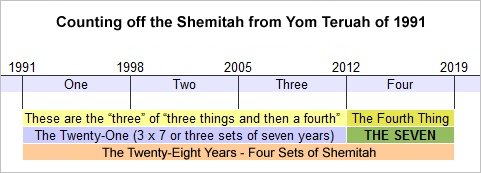A couple posts back, I wrote that what has been brought forth about obedience regarding such as adornment, marital subjection and head covering is not yet what will shake some of us from deep slumber. As this challenging series of posts continues, I ask once again for your patience as this work is brought forth here and in your life. Even having now addressed the matter of a woman teaching a man, there remains more to be brought forth concerning what things daughters of Sarah know and practice, and what pertains to the Bride of HaMashiach as preparation for her Bridegroom.
After the last post you may be convinced that I've lost my mind. I'm not disconnected from reality but I'm just not interested in persisting status quo or playing religious games. I have no affiliations with institutions or associations with constraining agencies. I've been brought to such a place where I have few if any conflicts of interest or competing agendas. I'm not trying to defend anything or anyone or become popular. I'm not here to act friendly: I'm here to be a friend. My "angle" is that I'm conscious of how you and I will share in each other's reward. Hey, help me out, won't you? :)
We need each other in this hour, to pray and intercede as the Lord directs, to encourage, uplift and support as we seek to discover and abide in the narrow way. It's difficult to remain fast in the light when all we want to do is flee into the darkness. I want to encourage you to abide with me in this. Please pray for those whom the Lord draws to this blog, that they will receive what the Lord has for them and return unto Him what is His due.
I can't share with you the touching personal testimonies shared with me, but I want you to be assured that the Lord is faithful, who promises. He upholds His word and strengthens His people. Those who are hearing His voice and dare to respond with courage and faith are being rewarded even now with tokens of His love, which are testifying of what great things are yet to come!
There is a passage in I Corinthians 14 that must now be considered.
34) Let your women keep silence in the churches: for it is not permitted unto them to speak; but they are commanded to be under obedience as also saith the law.
35) And if they will learn any thing, let them ask their husbands at home: for it is a shame for women to speak in the church. I Corinthians 14:34-35
Instead of following these directives with specific scriptural reasons why, like in 1 Timothy 2 and 1 Corinthians 11, the basis is assumed to be so well established that, "as also saith the law" provides adequate support. These directives are immediately followed by an assertion of authority by the Apostle that Paul was, ordained and anointed to bring forth the commandments of the Lord.
36) What? came the word of God out from you? or came it unto you only?
37) If any man think himself to be a prophet, or spiritual, let him acknowledge that the things that I write unto you are the commandments of the Lord.
38) But if any man be ignorant, let him be ignorant.
I Corinthians 14:36-38
It is as though the spirit of the Lord is testifying to those who challenge the truth and authority of what was declared in a forceful and rather blunt way: "Because I said so - that's why. Deal with it." Paul by the holy spirit had to know folks would squawk about this, striving against the hardness of its appearance as it confronts the carnal mind.
When the Word of the Lord is given, some will perceive it. "My sheep hear My voice," the Good Shepherd has testified according to the tenth chapter of John. There are, on the other hand, those who do not hear His voice, and they will not follow Him. I won't make a fuss about those who won't hear what is written about women speaking in the assembly. "But if any man be ignorant, let him be ignorant."
If you want to stay the mess you are in the mess you're in, do as you have done. If you want to be free - change! There is in this post a message of great value. I love you. I'm telling you the truth.
What circumstances are addressed in 1 Corinthians 14 are similar to but different from what's addressed in 1 Timothy 2. We must be discerning and considerate of the details in this matter so there's no confusion. When one has no concern for obedience, all these things can be broadly dismissed and the details are of no concern. When one has in mind to honor the Lord with obedience to His commands, the details matter! Let's get it right! He is worthy of our every effort!
Some of us can accept what has been declared without a struggle and there's not too much more that needs to be said. Most require more explanation, which will do nothing to alter the simplicity of the truth presented but offers more insight that engages us and helps us define what obedience looks like in our world as we endeavor to walk it out in shoe leather.
Where the passage in Timothy prohibits a woman from teaching a man, we find that the passage in Corinthians extends further to include all speaking without regard for content or purpose. The passage in Timothy doesn't specify whether what is done is in an assembly or in private, so there is no limit placed on the context. In Corinthians, however, the context in which it is a shame for women to speak is specifically that of a mixed gender assembly.
The prohibition in 1 Corinthians 14 relates to women speaking in the church. What is meant by 1. speak 2. women 3. the church?
What does it mean to "speak"?
In contrast to "silence" meaning "quietness of manner" in 1 Timothy 2, when you read
keep silence in Corinthians it means just that, silence; i.e. hold your peace. Follow the links on the words "keep silence" and "speak" to the Blue Letter Bible's Greek resources.
34) Let your women keep silence in the churches: for it is not permitted unto them to speak; but they are commanded to be under obedience as also saith the law.
35) And if they will learn any thing, let them ask their husbands at home: for it is a shame for women to speak in the church. I Corinthians 14:34-35
That "silence" really does mean "silence" is confirmed by the use of the Greek word "laleo" for
speak in verses 34 and 35.
Strong's Outline of Biblical Usage reveals how the prohibition is such that a woman's voice is not even to be heard.
"
laleo"
1) to utter a voice or emit a sound
2) to speak
a) to use the tongue or the faculty of speech
b) to utter articulate sounds
3) to talk
4) to utter, tell
5) to use words in order to declare one's mind and disclose one's thoughts
a) to speak
Can women teach in the church? No. Can women prophesy in the church or read from the scriptures? No. Can a woman give her testimony? How about announcements? Can they sing in the choir? No, no and no. Ahah! Can they sign for the deaf? Hey, come on. There's no prohibition against a woman being present in the church or serving in some capacity, however, if words come out of her mouth she is not keeping silence and it's a shame. Really, a shame? Yes, a shame, base or dishonorable.
Some challenge the comprehensive prohibition against women speaking in church with claims that it only pertains to the asking of questions, because verse 35 reads, "
if they will learn any thing, let them ask their husbands at home." If one places the entire focus of attention upon that to the exclusion of all else, one could make their point, but not honestly. Such is the common manner of taking of what's provided for further insight and wrestling it to obscure and contradict the simple truth. That kind of "reasoning" is the rebellious striving of the carnal mind against the spirit for the justification of sin, the seeking for a personal exemption, loophole, excuse or escape route.
What is meant by "women"?
Some insist this only applies to married women because of how verse 35 reads, "
if they will learn any thing, let them ask their husbands at home," and logically, only married women have husbands. The Greek words used in the biblical text cannot be used to support the "married women only" argument. The Greek word used for "husband" is "aner," which is translated "husband" 50 times but as "man" 156 times in the KJV. What determines whether an "aner" is married comes from the context. Such is also the case with the Greek word used for women, "gyne" (as with "gynecology," literally "the study of women"), which is translated "wife" 92 times and "women" 129 times in the KJV. The words
aner and
gyne generally reference the genders as male and female without explicit reference to age or marital status. Neither can the context be used to support the supposition that "women" means "married women." To suggest that Paul addressed the situation of married women and completely neglected addressing females of unmarried status is to express ignorance about the context of the presentation, of Paul's manner and the "real world" he lived in and ministered within. Who are the women that are to keep silent in the church? Females.
When we read in verse 34, "
but they are commanded to be under obedience as also saith the law," it should be plain enough that the direction here is not a "New Testament" invention or some departure from the long-standing tradition of a culture rooted and grounded in "the law." Even the converted saints of the pagan culture of Corinth in that day must have had a sufficient model before them.
Many women today are unable to ask their men at home because there are no men at home. Yet, you may perceive how this is not supposed to be the case. The law as given and practiced provided for women to have a man at home, whether married or unmarried. A woman was first subject to her father. If and when she married, she became subject to her husband. Consider Numbers 30 and Ruth 1, and study up on the godly culture of old, if you're interested. If the father was dead, the woman was subject to the patriarch of the house. Women didn't just have roommates, living with their boyfriends or girlfriends, and, except in rare circumstances did not live alone. What was recorded in 1 Corinthians 14:35 was and is valid. Are you a woman with no man at home? You have a problem that I recommend very seriously seeking the Lord about as to His provision for you. "Independence" is not the blessing you may been led to think it is.
When a woman wants to learn and can't speak in the church and there's no man at home, well, she has a problem. What is a woman of faith to do? The answer seems pretty simple. If you're some father's unmarried daughter, unless he won't have you, your place should be obvious. A lot of things could be and must be taken into consideration in such matters as this. If you're willing and truly seek to honor Him, dear sister, the Lord will direct you and grant favor as you trust Him. With regard to changing your marital status, what's written in 1 Corinthians 7 must be considered, and you may consider dwelling with brothers, sons, uncles or cousins as appropriate.
You may have noticed how there is nothing here in these posts resembling counsel for the faithless. This is not Staples and there is no Easy Button. Yet, we do have a Helper who is abundant with mercy and grace! The Lord calls out, "Trust me."
What is meant by "in the churches" or "in the church"?
The context of 1 Corinthians 14 presents us with the church as an assembly where men and women have gathered to engage in teaching, prayer and fellowship. There may also be speaking with tongues, prophecy, the singing of praise, worship, perhaps a baptism, etc. It's a gathering where saints are doing what saints are inspired to do when they meet.
Early in the history of the church "assembling" usually happened in someone's house. Big halls with bench seating, platforms and podiums, not so much, until pagan temple models were adopted and merged. Today, of course, there's a variety of venues, but the home is where it really happens best. Such a place of assembling may be a home or a hall, a yard, a park or a beach, a bus, car, train or plane. It may be called church, fellowship, chapel, camp meeting, conference or seminar. Today, the state of communications technology requires that we identify such a place or instance of assembly a little more broadly than in Paul's day because, while we may still at times meet "locally," in one location, many and perhaps most of us assemble in remote locations facilitated by phone lines, fiber optic cables, satellites, wireless networks and the Internet.
With all the ways we interact socially, what qualifies as a 1 Corinthians 14 church has expanded. Such an assembly may be happening in the context of a chat room, a conference call, a Web forum, a Webinar, online groups, lists or even group email, YouTube, Facebook and Twitter. It's perhaps easier to more strictly define what such a church is not. 1. Private communication between two people. 2. A gathering of saints where no man is present. 3. A mixed gender gathering where activity such as pictured in 1 Corinthians 14 is not happening.
In a nutshell, what does this mean to us?
A women teaching a man or usurping authority over him should not be allowed in any context, public or private (1 Timothy 2). Taking the traditional Sunday morning meeting at the corner church under consideration as the most simple situation, words should not be heard from any female because it's a shame for women to speak in church. After "church" in the fellowship hall, is a woman free to speak? That depends. If folks are engaging in "assembly behavior" and a man is present, it's "church" and she must hold her peace. How about after church when the folks go out to eat together? Ditto. In the marketplace and elsewhere, where and when no "church" activity is being engaged in (or no man is present to hear if there is), a woman is certainly free to speak because the gathering is not a biblical assembly. One who is attentive will be aware how situations change quickly without notice, and it's easy enough to perceive it and then also to recognize when a woman is speaking.
The question we might best be asking at this point isn't whether this is a realistic expectation but whether this is the correct model for our behavior. It's not realistic to expect folks raised in a wicked rebellious Jezebel controlled Mystery Babylon culture to become daughters of Sarah and become worthy of being joined to the Bridegroom, yet, it happens.
When and where two or more men are led by the holy spirit to engage in such activities that are presented in 1 Corinthians 14, if a woman is present she must not speak. No questions, no words. If you're a woman and you're unsure about whether you should hold your peace, err on the side of sacrificing what you may prefer for what He may prefer.
If there's a radio show with "biblical assembly" character and folks are invited to call in with questions or comments, should a woman call in? No, that would be speaking in church. If there's a BlogTalkRadio show with preaching or teaching, prayer or prophecy, etc, and the chat room is open, and if a man is the host, guest or participating in the chat, should a woman actively participate in the chat? Technically, she wouldn't be speaking audible words, so there would be no violation of the letter of the law. However, the spirit of the law would certainly be violated so, no, she should not chat. If there is a forum, or something forum-like that is an arena for public discourse on biblical subjects, unless all men are specifically excluded as participants a woman should not be "heard."
If a blog post is ministering to the saints and provision is made for the submission and posting of comments, should a woman submit a comment? That depends. If comments are moderated and there is no provision to contact the blogger directly, the comment feature is a legitimate means of personal contact. If a woman's comment is submitted and subsequently published and therefore made public, the result is equivalent to speaking in church, is it not? (Ahhhh, right. Give me a few days to adjust my blog, if you would be so kind. I'm learning as I go. Thanks Lord for your exceeding great mercy!) Ladies, if you submit comments to such a blog, it should only be done where there is an assurance that it would not be published lest you be "heard speaking in church."
These examples aren't meant to be the beginnings of a comprehensive manual. This is a guide to inspire those who seek wisdom. How are we to know when a woman is permitted to speak? Here's two recommendations.
1. Want to obey, to please the Lord with subjection in all things.
2. Consider what qualifies as "church" in your life, seeking the Lord's guidance. Expect His help in identifying such and be attentive to His still small voice.
Women, where there's doubt, hold your peace. Men, where there's doubt, show mercy and permit it until the Lord's mind and heart is known with confidence. Seek the Lord about what He would have you do, when and how - and simply follow through with love and faith.
I'm aware how this will stimulate many readers and prompt further questions. The best way to get understanding is to commit yourself to practicing what you know is right. Lord willing, this work on the blog will continue and further light will be brought forth in these matters. I ask yet one more time for your patience as this work is brought forth here and in your life.
 The Eye of Horus signaled by the letter "i" is powerful because it has the homonym value of "i" and eye, it's the 9th letter of the alphabet (9 signals the triple-helix genetic transformation of the mark of the beast), it mimics the form of the pyramid with a detached capstone, and it appeals to the carnal nature as a reference to self.
The Eye of Horus signaled by the letter "i" is powerful because it has the homonym value of "i" and eye, it's the 9th letter of the alphabet (9 signals the triple-helix genetic transformation of the mark of the beast), it mimics the form of the pyramid with a detached capstone, and it appeals to the carnal nature as a reference to self.  The io9 branding has lots of this Eye of Horus imagery at work. The creepy head is signaling Horus "who rules with two eyes," because the left eye is obscured. The i has the dot offset, which provides visual balance with the 9 because the dot matches to the leg of the 9. The i is the 9th letter, and they are calling out the equivalence with symmetrical matching. The symmetry is rotational, as around the "o" that is itself an eye.
The io9 branding has lots of this Eye of Horus imagery at work. The creepy head is signaling Horus "who rules with two eyes," because the left eye is obscured. The i has the dot offset, which provides visual balance with the 9 because the dot matches to the leg of the 9. The i is the 9th letter, and they are calling out the equivalence with symmetrical matching. The symmetry is rotational, as around the "o" that is itself an eye. 
 The twenty-one laps logo is a sideways "21" followed by an "L." To see the stylized 21 we have to rotate the logo clockwise.
The twenty-one laps logo is a sideways "21" followed by an "L." To see the stylized 21 we have to rotate the logo clockwise.  Each element is formed with six strands, presenting us with three sixes, 666. Some secondary design elements appear that are perhaps simulated lens or diffraction artifacts, three hexagrams. This trio of six sided figures presents another 666.
Each element is formed with six strands, presenting us with three sixes, 666. Some secondary design elements appear that are perhaps simulated lens or diffraction artifacts, three hexagrams. This trio of six sided figures presents another 666. This insight exposing the 21 and the 12 suggests a date many are very accustomed to seeing these days! The date represented as 12/21/12 is purported to be the ominous end point of the Mayan long count calendar, the resolution of many esoteric crop circles and the result of other notable observations. The graphic you see on the right has the 21 flanked by a pair of counter-rotations to present the date.
This insight exposing the 21 and the 12 suggests a date many are very accustomed to seeing these days! The date represented as 12/21/12 is purported to be the ominous end point of the Mayan long count calendar, the resolution of many esoteric crop circles and the result of other notable observations. The graphic you see on the right has the 21 flanked by a pair of counter-rotations to present the date.  Right. Slim indeed.
Right. Slim indeed. Such a figure is a simple and more obscure equivalent to the ubiquitous square and compass of Freemasonry. In any and every alignment of this figure, the sides adjacent to the right angle are the parents that produce the hypotenuse as their offspring. They are as the Egyptian trinity Osiris, Isis and Horus, and the focus is ever upon the reproductive element that will produce the Beast and the mark of the Beast.
Such a figure is a simple and more obscure equivalent to the ubiquitous square and compass of Freemasonry. In any and every alignment of this figure, the sides adjacent to the right angle are the parents that produce the hypotenuse as their offspring. They are as the Egyptian trinity Osiris, Isis and Horus, and the focus is ever upon the reproductive element that will produce the Beast and the mark of the Beast. The check mark-like element in the Verizon (veri = truth) Wireless branding is such a Pythagoras signaling.
The check mark-like element in the Verizon (veri = truth) Wireless branding is such a Pythagoras signaling.  So also is the nose in the LG logo, which is a pretty obvious "Horus that rules with two eyes" symbol.
So also is the nose in the LG logo, which is a pretty obvious "Horus that rules with two eyes" symbol.  to consider that includes two from this post, a variety of Eye of Horus symbols with "i" and "R" connections.
to consider that includes two from this post, a variety of Eye of Horus symbols with "i" and "R" connections. So, this 21 years appears to be equivalent to the "three things" or sets of seven years, shemittah, counted off from the celestial sign of 1991.
So, this 21 years appears to be equivalent to the "three things" or sets of seven years, shemittah, counted off from the celestial sign of 1991.



 The Apple brand is an Eye of Horus symbol that hearkens back to the Garden of Eden as a reference to Luciferian illumination and gnosis, and as a flagrant boast of the serpent's conquest over Adam and Eve.
The Apple brand is an Eye of Horus symbol that hearkens back to the Garden of Eden as a reference to Luciferian illumination and gnosis, and as a flagrant boast of the serpent's conquest over Adam and Eve. The apple logo from 1976 to the present is an "i" of Horus, with the apple leaf dotting the "i." The leaf pictures the flame of an apple candle, a source of illumination.
The apple logo from 1976 to the present is an "i" of Horus, with the apple leaf dotting the "i." The leaf pictures the flame of an apple candle, a source of illumination.  The coloring of the classic rainbow logo used from 1976 until 1998 reveals how it compares to the Great Seal's pyramid with an "Osiris green" Beast capstone hovering above it.
The coloring of the classic rainbow logo used from 1976 until 1998 reveals how it compares to the Great Seal's pyramid with an "Osiris green" Beast capstone hovering above it.  A mobile commerce network was announced in November of 2010 that assumed the identity of the mother of Horus, Isis. The Roman Catholic church venerates Isis under the alias Mary. Isis is the goddess of America as attested to by the Statue of Liberty, the Liberty Bell and
A mobile commerce network was announced in November of 2010 that assumed the identity of the mother of Horus, Isis. The Roman Catholic church venerates Isis under the alias Mary. Isis is the goddess of America as attested to by the Statue of Liberty, the Liberty Bell and  In the collection of images presented on the right, the ISIS logo appears in the upper left. Below it is how it would look in a reflecting pool, a visual signal of the Hermetic Maxim, "As above, so below." When you see that reflected image as two letters "R," you perceive the embedded Eye of Horus imagery. As common to corporate logos, it's a clever graphic! And evil!
In the collection of images presented on the right, the ISIS logo appears in the upper left. Below it is how it would look in a reflecting pool, a visual signal of the Hermetic Maxim, "As above, so below." When you see that reflected image as two letters "R," you perceive the embedded Eye of Horus imagery. As common to corporate logos, it's a clever graphic! And evil! Imagery picturing the rising sun signals the approach of the Beast as a sun god and counterfeit Messianic Bridegroom (Psalm 19:4-6). Even outside the context of the Hinomaru (sun disk) being Japan's national emblem, it's fairly common.
Imagery picturing the rising sun signals the approach of the Beast as a sun god and counterfeit Messianic Bridegroom (Psalm 19:4-6). Even outside the context of the Hinomaru (sun disk) being Japan's national emblem, it's fairly common.  The most vivid example that comes to my mind is the logo for Barack Obama, which I presented in a post titled
The most vivid example that comes to my mind is the logo for Barack Obama, which I presented in a post titled  PositiveId finds mention pretty regularly in this blog and it's appropriate to shine the light their way once again. Their logo and branding signals the Eye of Horus. The letter "o" in their logo is an illuminated eye - the Eye of Horus. Their product named iGlucose follows the popular convention of prepending the lower-case "i" on products to express personalization. More importantly, this trend expresses the "i" of Horus, which I'll address in the context of Apple's branding in a future post, Lord willing.
PositiveId finds mention pretty regularly in this blog and it's appropriate to shine the light their way once again. Their logo and branding signals the Eye of Horus. The letter "o" in their logo is an illuminated eye - the Eye of Horus. Their product named iGlucose follows the popular convention of prepending the lower-case "i" on products to express personalization. More importantly, this trend expresses the "i" of Horus, which I'll address in the context of Apple's branding in a future post, Lord willing.  If all this seems familiar, mobile commerce and the chip's health connection was addressed in the
If all this seems familiar, mobile commerce and the chip's health connection was addressed in the